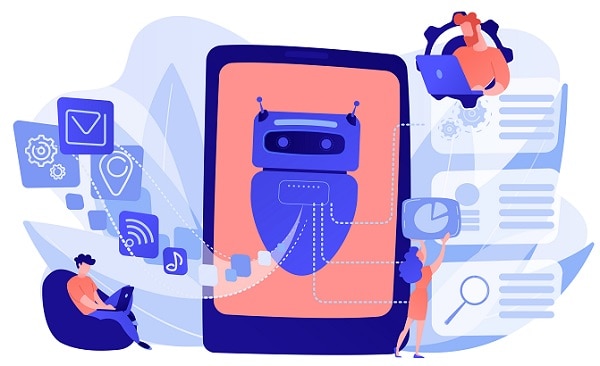You’ve used artificial intelligence (AI). Whenever you get on a website and a chat window pops up, and you engage in conversation, you’re using AI. If you use voice search for Google (“Hey Google, what’s AI?”) you’re also using AI.
So really, it’s technology that’s not as foreign or complicated as you think. Although AI started as something out of science fiction, its development is leading to widespread adoption and, in most cases, everyday use.
When you’re running an online business, you’re probably using a few tools already to manage it. How helpful is AI in business?
Also read: 10 Essential Business Tools for Ecommerce
What is AI in business?
AI is a transformative force in business, revolutionizing traditional practices and unlocking opportunities for growth and efficiency. But what is it really?
AI refers to the simulation of human intelligence processes by machines, enabling them to perform tasks that usually require human intelligence, such as problem-solving, learning and decision-making.
Artificial intelligence in business covers a wide range of technologies, including machine learning, natural language processing, computer vision, and robotics, among others. These technologies empower businesses to:
- Automate processes
- Gain insights from data
- Enhance customer experiences, and
- Drive innovation across various functions
How businesses use AI
AI can help enhance efficiency, decision-making and overall performance. Here are some common ways in which AI is used in business settings:
1. Content
AI is used in content creation and curation, enabling businesses to generate personalized and engaging content at scale. Natural language processing algorithms analyze consumer preferences and behaviors to tailor content for specific audiences, driving higher engagement and conversion rates.
2. Sales
AI-powered sales tools optimize sales processes by analyzing vast amounts of data to identify potential leads, predict customer behavior, and personalize sales strategies. Sales teams leverage AI-driven insights to prioritize leads, optimize pricing strategies, and enhance customer relationships, ultimately driving revenue growth.
3. Marketing
AI revolutionizes marketing strategies by enabling precise targeting, dynamic pricing and personalized recommendations.
Machine learning algorithms analyze customer data to identify patterns and trends, letting marketers create targeted campaigns, optimize advertising spend, and deliver personalized experiences across multiple channels.

and customer service.
4. Human Resources (HR)
AI streamlines HR operations by automating repetitive tasks, such as resume screening, candidate sourcing, and employee onboarding.
AI-powered recruitment platforms use natural language processing and machine learning to match candidates with job requirements, enhance diversity in hiring, and improve employee retention.
5. Accounting and finance
AI enhances accuracy and efficiency in accounting and finance processes through automation and predictive analytics. AI algorithms automate routine accounting tasks, detect anomalies in financial data, and forecast future trends, enabling businesses to make informed financial decisions and mitigate risks.
6. Data gathering and analysis
AI enables businesses to extract actionable insights from large volumes of data, driving informed decision-making and predictive analytics. Machine learning algorithms identify patterns, correlations, and anomalies in data, uncovering valuable insights that inform strategic initiatives and drive business growth.
7. Customer service
AI-powered chatbots and virtual assistants provide personalized and real-time customer support, improving response times and enhancing customer satisfaction.
Natural language processing enables chatbots to understand and respond to customer inquiries, resolve issues, and escalate complex queries to human agents when necessary.
#NinjaTip: Automate and streamline your ecommerce. Ninja Van’s ecommerce API integration works perfectly with top ecommerce platforms, like Shopify, Pancake, WooCommerce, Anchanto, and more. Learn more about it here.
10 impacts of AI in businesses
1. Enhanced efficiency
AI automates repetitive tasks, streamlines workflows, and optimizes resource allocation, enhancing operational efficiency and productivity across various business functions.
2. Improved decision-making
AI-driven analytics provide businesses with actionable insights, enabling data-driven decision-making and strategic planning based on real-time information and predictive analytics.
3. Personalized customer experiences
Your business can deliver personalized products, services, and experiences tailored to individual preferences and behaviors, driving customer engagement and loyalty.

4. Cost reduction
You can reduce operational costs by automating labor-intensive tasks, optimizing resource utilization, and minimizing errors, leading to significant cost savings for businesses.
5. Competitive advantage
AI empowers your business to gain a competitive edge by enabling faster innovation, greater agility, and superior customer experiences compared to competitors.
6. Scalability
Scalability is a key impact of AI in business. AI-driven automation and optimization enable businesses to scale operations efficiently, adapt to changing market demands, and seize growth opportunities without compromising quality or efficiency.
7. Risk mitigation
AI enhances risk management by detecting fraud, identifying anomalies, and predicting potential risks based on data analysis, enabling businesses to proactively mitigate risks and protect against financial losses.
8. Innovation acceleration
AI fuels innovation by enabling you to explore new ideas, experiment with emerging technologies, and develop novel solutions to complex challenges, driving continuous improvement and competitive advantage.
9. Workforce transformation
Reshape your workforce by augmenting human capabilities, automating routine tasks, and creating new opportunities for skill development and career advancement in emerging fields such as data science, machine learning and robotics.
10. Ethical considerations
AI applications in business (and elsewhere, really) raise ethical considerations related to data privacy, bias in algorithms, and the impact on jobs and society, prompting businesses to adopt responsible AI practices and ethical guidelines to ensure transparency, fairness, and accountability.
Why embrace AI in business
The impact of AI in business is profound and varied, offering opportunities for innovation, growth, and competitive advantage. To embrace these technologies means enhancing efficiency, improving decision-making, personalizing customer experiences, and driving sustainable growth in an increasingly complex and dynamic business landscape.

But to realize the benefits of AI in business, you need a strategic approach to adoption, invest in talent development, and prioritize ethical considerations. AI is not just a technological tool but a catalyst for business transformation, empowering you to navigate challenges, unlock new opportunities, and shape the future of commerce and industry.
What business wouldn’t want those outcomes?
More helpful tips for your ecommerce business:
What is Ecommerce API Integration and Why Do You Need It?
The Top Benefits of Warehouse Automation
Ecommerce Trends that Have Changed Logistics






